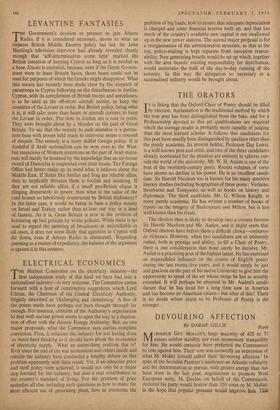ELECTRICAL ECONOMICS
THE HerbertCommittee on the electricity industry—the first independent study of this kind we have had into a nationalised industry—is very welcome. The Committee comes forward with a host of constructive suggestions which Lord Citrine, the Chairman of the Central Electricity Authority, brightly described as 'challenging and stimulating.' A few of the points made have perhaps not been thought through far enough.,For instance, criticism of the Authority's organisation to deal with nuclear power seems to open the way to a duplica- tion of effort with the Atomic Energy Authority. But, on, two major proposals, what the Committee says carries complete conviction. First, it criticises the industry for not having done `as much hard thinking as it should have about the economics of electricity supply.' What an astonishing position this is! Ever since the end of the war economists and others inside and outside the industry have conducted a lengthy debate on this problem apparently with little result. Yet, if an adequate price and tariff policy were achieved, it would not only be a major step forward for the industry, but also a real contribution to the country's standard of living. For the problem of price underlies all else, including such questions as how to make the most efficient use of generating plant, how to overcome the problem of big loads, how to ensure that adequate depreciation is charged and some financial reserve built up, and that too much of the country's available new capital is not swallowed up in the new power stations. The second major proposal is for a reorganisation of the administrative structure, so that lit the top, policy-making is kept separate from executive respon- sibility. New generating boards would be set up which, together with the aiea boards' existing responsibility for distribution, would undertake the bulk of the day-to-day running df the industry. In this way the delegation so necessary in a nationalised industry would be brought about.


































 Previous page
Previous page